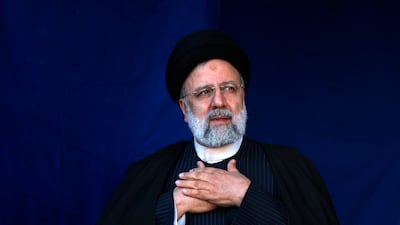Iran's President Ebrahim Raisi has died aged 63 in a helicopter crash in northern Iran.
Mr Raisi was president from 2021 until his death on Sunday and was widely regarded as the potential successor to supreme leader Ayatollah Ali Khamenei, who has ruled the country since 1989.
In his three years as president, Mr Raisi ruled through a wave of crises – from the coronavirus to increasing regional tension – and tightened Tehran's strict interpretation of its "revolutionary ideals".
As President, he cemented Iran's nuclear ambitions in the face of international sanctions and oversaw the response to the most widespread anti-regime protests in the country's recent history.
Born in 1960 in Mashhad, an important city in north-eastern Iran, Mr Raisi grew up in a clerical family at a time when many in Iran's religious establishment were becoming disillusioned with the Shah's modernising reforms.
In 1975, he studied under some of Iran's most prominent clerics at the seminary in Qom, one of the centres of Shiite Islamic thought, and took part in the wave of demonstrations that became the 1979 Islamic Revolution.
While the revolution initially comprised a range of groups opposed to the Shah's increasingly authoritarian rule, it resulted in the formation of the Islamic Republic of Iran, led by supreme leader Ayatollah Ruhollah Khomeini, with the religious establishment entrenching itself in the new regime.
Mr Raisi was trained in administration and served as a prosecutor in several Iranian cities, including in the capital Tehran between 1989 and 1994, before serving as First Deputy Chief Justice and Iran's Prosecutor General in 2014.
The former judiciary official was also known for his role in the execution of thousands of political prisoners in the 1980s.
As a prosecutor, Mr Raisi was one of four judges who sat on secret tribunals given the task of drawing up lists of prisoners to be executed during the Iran-Iraq War.
The tribunals later came to be known as the "death committee," with thousands of prisoners sentenced to death.
At least 5,000 political prisoners were executed under his watch, according to Amnesty International. Mr Raisi has denied his role in the sentencing.
He was trained by Ayatollah Ali Khamenei, who succeeded Mr Khomeini as Iran's supreme leader in 1989.
In 2016, he was appointed as the custodian of the shrine of Ali Al Rida in Mashhad, which left him in charge of Iran's largest charitable trust, with billions of dollars of assets.
Mr Raisi, who had become a member of Iran's Assembly of Experts in 2007, first stood for president in 2017, campaigning on an anti-corruption ticket.
He was defeated by the reformist Hassan Rouhani in a landslide, securing 38 per cent of the vote.
Two years later, he was named as head of the judiciary and was elected as the head of the Assembly of Experts, giving him a powerful position within Iran's establishment.
In 2021, he became President after winning 62 per cent of votes in an election critics say was manipulated.
His term began amid the pandemic, in which more than 140,000 Iranians died.
Iran's economy also suffered from the effects of US sanctions and high inflation.
Little more than a year after Mr Raisi came to power, Iran was rocked by the death of Mahsa Amini, 22, in morality police custody, sparking the fiercest public opposition to the regime in its four-decade rule.
Demonstrations against the regime spread to every province across Iran, with security forces responding by killing about 600 people and arresting another 20,000.
Mr Raisi accused the demonstrators, mostly young women, of being backed by the US and Israel, and took Iran's strict rules on women to new heights, sending more morality police on to the streets and installing security cameras to monitor women in their cars.
A wave of executions followed, which rights groups say has continued to surge amid international focus on the war in Gaza.
The President also banned inspectors with the UN's nuclear agency from visiting the country and oversaw record levels of nuclear enrichment, stoking concern that Tehran was pursuing its ambitions undeterred.
In 2023, Iran and Saudi Arabia announced they were restoring diplomatic relations.
Under Mr Raisi, Tehran continued its policy of arming and supporting militias across the region, including Hamas in Gaza and Hezbollah in Lebanon.
Iran came close to all-out conflict with Israel in April, when Tehran launched a barrage of rockets and missiles against Israel after an Israeli strike killed several Iranian commanders in Damascus.
The two countries walked back from the brink, but Iran remained committed to supporting the "Axis of Resistance" across the region during Mr Raisi's presidency.
His death in a helicopter crash close to the border with Azerbaijan sent shock waves across Iran, and the wider region.
Mr Raisi was married to Jamileh Alamolhoda, an educational sciences lecturer at Tehran's Shahid-Beheshti University, and had two daughters.



















